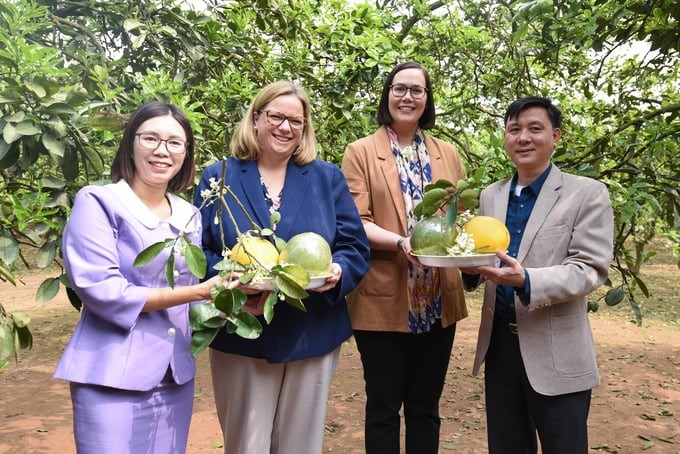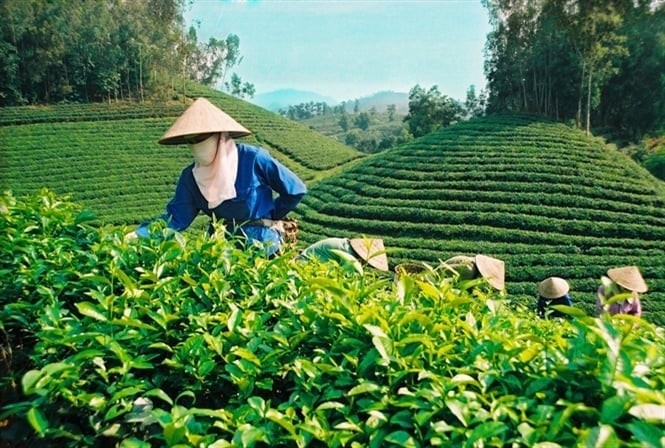May 27, 2025 | 20:32 GMT +7
May 27, 2025 | 20:32 GMT +7
Hotline: 0913.378.918
May 27, 2025 | 20:32 GMT +7
Hotline: 0913.378.918
The Minister of Agriculture and Rural Development (MARD) has just signed and promulgated Circular No. 09/2023/TT-BNNPTNT dated October 24, 2023, on the List of Pesticides Allowed for Use in Vietnam and the List of Pesticides Banned from Use in Vietnam.
The List of Pesticides Allowed for Use in Vietnam and the List of Pesticides Banned from Use in Vietnam are issued based on the plan to develop MARD’s legal documents in 2023, the provisions of the Law on Promulgation of Legal Documents and the Law on Plant Protection and Quarantine, and the requests of organizations and individuals for officially registering and supplementing pesticides.

The List of Pesticides Allowed for Use in Vietnam in 2023 adds some types of pesticides that prevent harmful organisms on a number of crops with high export value, such as grapefruit, dragon fruit, etc. Photo: Le Hoang Vu.
The promulgation of Circular No. 09/2023/TT-BNNPTNT aims to ensure the suitability, consistency, and synchronization of current legal documents in the field of pesticide management. Supplement and update information on new pesticides and biological pesticides to promptly serve agricultural production; ensure convenience for organizations and individuals to produce, import, and trade pesticides in accordance with the law.
Circular No. 09/2023/TT-BNNPTNT was compiled by the Plant Protection Department in accordance with the order and regulations of the Law on Promulgation of Legal Documents and consulted with relevant organizations and individuals such as Ministry of Justice, Ministry of Finance, Ministry of Science and Technology, Vietnam Fatherland Front; Department of Quality - Processing and Market Development, Department of Crop Production, the Legal Department, the Science, Technology, and Environment Department (Ministry of Agriculture and Rural Development); Vietnam Chamber of Commerce and Industry (VCCI), Departments of Agriculture and Rural Development of provinces and cities; Vietnam Lawyers' Association and associations related to pesticide management such as VIPA, Croplife, HACAS, etc.
Circular No. 09/2023/TT-BNNPTNT has been posted to the Vietnam Government Portal, MARD, and SPS.
The Draft Circular has also been evaluated and appraised by MARD’s Legal Department in accordance with regulations on necessity and conformity with the Party's guidelines and policies; constitutionality, legality, and consistency of the document with the legal system; and order and techniques for promulgating the Circular.
Circular 09/2023/TT-BNNPTNT was issued with 2 appendices: Appendix 1 is the List of Pesticides Allowed for Use in Vietnam, and Appendix 2 is the List of Pesticides Banned from Use in Vietnam. This Circular replaces Circular No. 19/2022/TT-BNNPTNT dated December 2, 2022, and takes effect on December 8, 2023.
The List of Pesticides Allowed for Use in Vietnam in 2023 is supplemented with 12 new active elements, of which 6 are biological pesticides (accounting for 50%), and the rest are new safe and effective active elements.
The number of biological pesticides registered in the list is 26 types, accounting for 10.79% of the total number of pesticides registered in the list. In addition, organizations and individuals registering pesticides have voluntarily withdrawn from the List of Pesticides Permitted for Use in Vietnam 15 types of pesticides.

The List of Pesticides Allowed for Use in Vietnam in 2023 is also supplemented with many effective drugs and advanced drug forms, especially those registered for use on vegetables, fruits, tea, etc. Photo: TL.
The List of Pesticides Allowed for Use in Vietnam in 2023 adds some types of pesticides that prevent harmful organisms on a number of crops with high export value, such as grapefruit, durian, dragon fruit, etc.
In addition, this list is also supplemented with many effective drugs and advanced drug forms such as OD, EW, WG, etc., especially those registered for use on vegetables, fruits, and tea that all have a short isolation time and low toxicity.
The List of Pesticides Banned from Use in Vietnam in 2023 includes 31 active elements banned from use (the quantity remains unchanged compared to Circular No. 19/2022/TT-BNNPTNT dated December 2, 2022).
The List of Pesticides Banned from Use in Vietnam complies with conventions and protocols of which Vietnam is a participant, such as the Stockholm Convention, the Rotterdam Convention, the Basel Convention, etc.
In the coming time, the Ministry of Agriculture and Rural Development will continue to review and remove types of pesticides with a high risk of affecting human health, livestock, the ecosystem, and the environment from the List of Pesticides Allowed for Use in Vietnam.
This review and elimination will make an important contribution to the management and use of pesticides in the upcoming time. At the same time, the List of Pesticides Allowed for Use will be leaner and create favorable conditions for users when choosing pesticides.
Translated by Huyen Vu Thu

(VAN) The mutual export of agrifood products between the European Union (EU) and the United Kingdom (UK) must occur again without certification, border controls or other red tape. This was agreed at the UK-EU summit.
/2025/05/22/5121-2-173645_677.jpg)
(VAN) NBSAP Tracker identifies strengths and areas for improvement in the National Biodiversity Strategy, based on each region’s priorities and capacities.

(VAN) The draft amendment to the Circular on rice export trading stipulates a periodic reporting regime for rice exporting enterprises.

(VAN) Dong Thap farmers attained an average profit margin of 64% during the summer-autumn 2024 crop (first season), while An Giang and Kien Giang farmers followed with 56% and 54%, respectively.

(VAN) As a doctoral student doing research on renewable energy and electrification at Harvard University, the author shares his musings on electricity, nature, and countryside memories.

(VAN) The decree on Extended Producer Responsibility (EPR) ensures transparent management and disbursement of support funds, avoiding the creation of a “give-and-take” mechanism.

(VAN) Hue City rigorously enforces regulations regarding marine fishing and resource exploitation, with a particular emphasis on the monitoring of fishing vessels to prevent illegal, unreported, and unregulated (IUU) fishing.